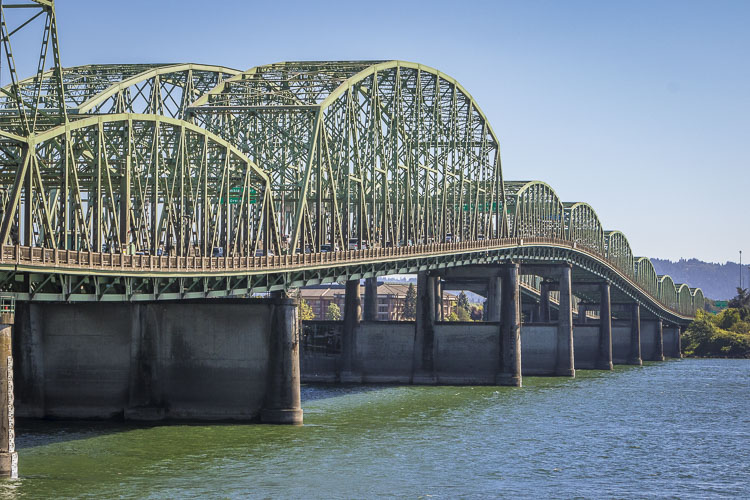
Councilors plan to vote on a resolution addressing Oregon’s variable rate tolls at Nov. 1 meeting
Members of the Clark County Council are preparing to take a vote on a resolution addressing Oregon’s plans to place “variable rate’’ tolls on the Interstate Bridge as well as on stretches of I-5 and I-205 in Oregon.
The Clark County Council has produced a “white paper” that addresses the tolling issue. Members of the council had the first reading of the resolution at Wednesday’s Council Time session and the second reading is scheduled for Wed., Oct. 26. The councilors are asking for public comment and they expect to vote on the resolution at their Nov. 1 meeting.

Councilor Dick Rylander represents the Clark County Council on the 25-member Regional Toll Advisory Committee (RTAC), which was established by the Oregon Department of Transportation (ODOT). ODOT officials met in August to consider the impact of tolling on the Portland metro area. Rylander worked with county staff to create the white paper on behalf of the County Council following earlier discussions regarding the Interstate Bridge Replacement and tolling in general.
“If we don’t take a stand, then the only representation on that (RTAC) committee for Clark County residents will be the city of Vancouver and the city of Vancouver has been supportive of tolls and light rail,’’ Rylander said. “I believe the vast majority of Clark County citizens have no interest in tolls. We need to stand up and speak on their behalf. We need to be on the record.’’
An estimated 75,000 Clark County residents work and pay income taxes in Oregon. Those citizens make up a sizable number of the 300,000 vehicles traveling on either I-5 or I-205 each day.
“I was asked to represent the County Council until the end of the year,’’ said Rylander, who was appointed earlier this year by Gov. Jay Inslee to fill a vacant seat on the Clark County Council. He filed for election to that District 5 seat but was not one of the two candidates (Don Benton and Sue Marshall) who advanced from the August primary election to the Nov. 8 general election. “I’m speaking up because I want the public to be heard. I want their position to be acknowledged and for it to be on the record.’’
And that position, essentially, boils down to the fact that there is no sunset clause on Oregon’s tolling plan, which is also not project specific.
“That to me is nuts,’’ Rylander said. “That is why I believe we need to strongly take a position that unless any toll packages are project specific and time limited, then they shouldn’t even be considered. If they are project specific and time limited, then we should consider them but the voters should still be able to say ‘yes’ or ‘no.’ Unless they can show the people of Clark County what the benefits are in tolling then we stand against it.’’
The summary of the white paper states “the tolling system, as proposed, places unreasonable and inappropriate burden on Washington residents.” This would cause significant financial harm to those working in Oregon, noting $325 million in Oregon income taxes were paid in 2020 by Clark County residents.
The paper notes that Oregon and Washington Transportation Commissions will actually set the tolling rates, and that both are considering some form of a “low income” tolling program “including exemptions and discounts.” The paper notes a “mobility pricing” program also being factored in that might charge people to drive on other roads.
The county mentions the tolls are proposed and being promoted for multiple reasons. They include saving travel time, funding critical maintenance and improvement, tolling will be an economic growth engine, and tolling will be beneficial to the environment. Concerns with the programs include “double tolling on I-5” (one for the bridge and another for driving the freeway), concerns with mobility pricing, and the cost of collection.
Rylander said that at the first reading, there were very few changes made by the five councilors. He also reported that he believed there was unanimous support among the councilors for the resolution.
Rylander did admit that, other than having a seat on the RTAC Committee, the County Council has very little power with which to fight Oregon’s tolling plan. Yet, he strongly feels the statement needs to be made and the citizens’ voices need to be heard.
“It strikes me as unbelievable that they want to tax us up the wazoo for everything and they want to do it 24/7,’’ Rylander said. “It has morphed into this monster.’’
Rylander also pointed out that in addition to the fact that the tolling plan isn’t project specific and without a given timeframe, the tolls are still unknown. During the Columbia River Crossing (CRC) debate a decade ago, it was estimated that tolls would be $8 for using just the replaced Interstate Bridge. Tolls would pay for approximately $1.5 billion in borrowed money as part of the $3.5 billion CRC project.
Rylander also pointed out that the cost of collecting the tolls was very expensive. For example, in Seattle on I-405 and SR167, the cost of collecting toll revenues ran 43 percent prior to the pandemic. In 2021, the cost of collection increased to 68 percent on the I-405/SR167 system.
The County Council discussion notes that with only two bridges across the Columbia River, the “double tolls” on I-5 are likely to increase traffic diversion on SR-14 and on I-205, which are already congested.
Citizens are encouraged to study the proposal and provide input and comments to the Clark County Council over the next two weeks. They can offer in-person comments at the regular Tuesday council meetings, or via email to individual county councilors.
Also read:
- Opinion: Hiding the growing cost of the Interstate Bridge replacementJoe Cortright of the City Observatory addresses the rising cost of the Interstate 5 Bridge replacement project.
- 90 minutes of delay on Southbound I-5 in Southwest Washington on Friday afternoon, July 26Travelers using southbound Interstate 5 through Woodland should expect up to 90 minutes of delay during Friday afternoon and evening and should delay travel or prepare for additional travel time.
- Nighttime paving work on I-5 and SR 14 in Clark County July 28-Aug. 9Nighttime travelers in Clark County should expect delays for maintenance and paving work beginning Sunday, July 28 until the morning of Friday, Aug. 9.
- Northeast 182nd Avenue/Northeast Ward Road to be closed on Aug. 1Northeast 182nd Avenue and Northeast 172nd Avenue in Clark County will have single-day closures on August 1 and August 5 for road preservation, with detours in place.
- Interstate Bridge Replacement program awarded $1.499 billion FHWA Bridge Investment Program grantInterstate Bridge Replacement program officials have shared that the program received $1.499 billion through the Federal Highway Administration’s Bridge Investment Program.









